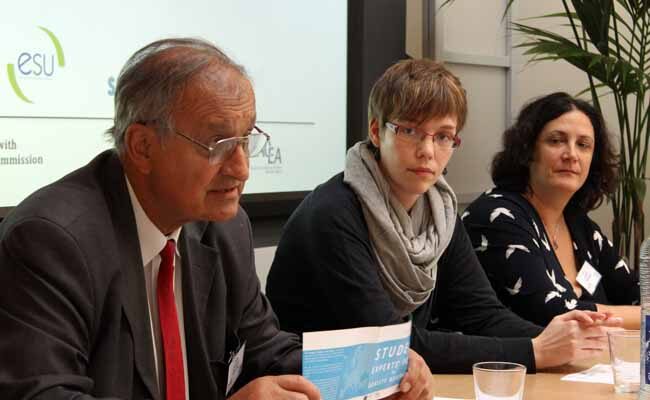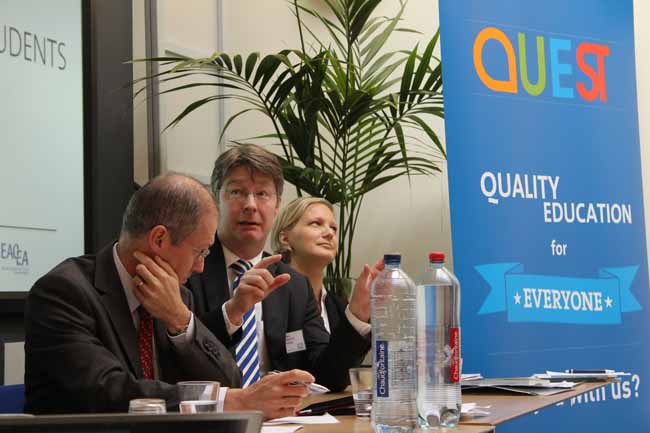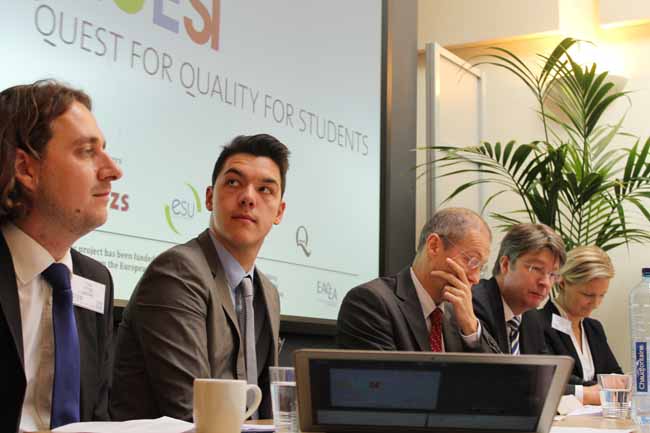
Students can affect the quality of their education
BRUSSELS – Useful guidelines on how students can get involved and affect quality assurance and enhancement activities have been published by the European Students’ Union (ESU) as part of the Quest for Quality for Students project (QUEST). This includes a student handbook on quality assurance and enhancement and a user driven Wiki-style website.
Student participation in quality Scotland (sparqs) contributed greatly to creating the content of the handbook and the website. These deliverables are useful to both students that are already engaged in student reviews and beginners. They describe the core basics of quality assurance and enhancement of higher education and lead the reader through the process from the start till the end, explaining how they can themselves become involved in or train others in such activities. Additionally, the benefits of including students in quality related activities are explained and are therefore not only useful to the students themselves, but also to staff members of institutions and other stakeholders in higher education.
The website also contains all the research publications that have been published as part of the QUEST project as well as further reading on quality assurance such as articles, training materials and a glossary with common terms used in discussions related to the topic. The website supports enhanced student engagement by informing the readers about good practices, such as by publishing lists of organisations, agencies and countries that involve students actively in quality assurance provisions.
Student experts on quality assurance
One of the initiatives promoted by ESU in order to reach this goal is the Students’ Experts Pool on Quality Assurance that was established in 2009. This experiment proved to be a success and currently there are over sixty students engaged in the work of the Students’ Experts Pool, which is supported by a Steering Committee of five individuals. All information about the members of this pool, its function, how to become a member and how to contact it has been made available on the QUEST website in order to strengthen the transparency of its work.
“It became clear to us during the QUEST project that students are in general not aware of quality assurance activities at different levels, especially not at the European level. The closer the mechanisms were situated to the participants’ day-to-day reality, the more knowledge they seemed to have about them. Involvement in the work of student bodies also enhanced students’ knowledge of quality assurance. We aimed at bringing these processes closer to students all around Europe through the QUEST project and we believe we have made a valuable contribution by publishing the website, the handbook and the QUEST research series,” says Fernando Miguel Galán Palomares, Vice-Chairperson of ESU and main coordinator of QUEST.
The handbook and the website were presented at the final conference of QUEST in Brussels on 31 October as well as other parts that have been published as part of the project. Even though the research part of the project has come to an end, ESU will use the results in its policy making processes and promote its results to decision makers and stakeholders in higher education. The website is an important part of that outreach and will be continuously updated.

Experts in higher education were invited to debate students’ role in quality assurance.

— END —
For more information, please contact:
Fernando Miguel Galán Palomares, ESU Vice-Chairperson: +32/473.669.892 // fernando@esu-online.org or Robert Hlynur Baldursson, ESU Communications Manager: +32/473.669.894 // robert@esu-online.org

The European Students’ Union, headquartered in Brussels, is the umbrella organisation of 47 national unions of students from 39 European countries. ESU represents and promotes the educational, social, economical and cultural interests of students at the European level. Through its member unions, ESU represents over 11 million students in Europe. To find out more about ESU, follow us on Twitter @ESUtwt, check out or Facebook page or visit www.esu-online.org. ESU celebrates its 30th anniversary in 2012.
